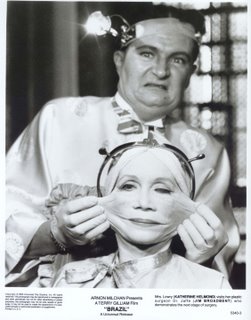
Reading "The Religion of Tech": "learning the arts anew would return man to his prelapsarian grace...medicine would restore mankind to its original immortatliy." I quess that's exactly what we are witnessing in this culture of antiaging and "nip and tuck". A lot of technology goes into the very idea of staving off the coporeal effects of the 'ravages of time'. A lot of people spending a lot of money on medicine and surgery to prolong life - to escape the inevitable - to attempt immortality- treating the body as not so much biological as mechanical and manufactured - claiming psycological reasons for such body amendments and contortions. On the other hand a lot of research and money continues to try and find the cures for the deadly diseases (that seem to elude us at every turn). Advances in medicine, and electronic and mechanical technologies have made life easier for those who suffer in ways that in centuries past would have made for a "short and brutish" life. Extending the length and dignity of life is a worthy cause - keeping in mind that there are undeniable and unalterable limits. We are the only animals that live and know those limits. Being aware of the limits of life - our impending death - hopefully inspires us to live the best life we can. I'm not sure that organized religion can accomplish that - at least not for me, but spirituality I believe is in all of us - a universal spirituality that transcends any kind of ritualized/formalized religion and works at a very individualized level. It's the main component of the inspiration of life. This aint no dress rehearsal!

3 Comments:
"Advances in medicine, and electronic and mechanical technologies have made life easier for those who suffer in ways that in centuries past would have made for a "short and brutish" life."
Hey fellow android,
I quoted you above because I’m interested in the tendency to view a 'pre-technological' history as "hard" and generally negative. It seems as if without the "progress" of technology we would be in "harder" times. Yet, although our environment has definitely grown, to what extend has mankind really progress? Sure, we live longer and more comfortably, but before villages exploded into metropolises, living spaces were relatively smaller and communities much closer. How do the myths of an isolated tribe differ from the myths of our electronic culture? The narratives are the same in attempting to explain the world we live in.
Technology no doubt contributes if not further complicates existential inquiries, yet nonetheless must refer to the epistemology of Descartes, Plato, and other philosophies emergent in a “pre-tech” era. In other words, technology transforms content from one form to another, yet the content remains the same.
Yet, to bite my tongue, now it seems technology has become the content. In the words of McLuhan, “the medium is the message”. So what happens now? I suppose this is a cop-out conclusion but I honestly don’t know how to answer this question. I suppose that’s why we’re taking this course.
I'm more or less comfortable with most modern advances in technology, but I'm not necessarily negative about the 'pre-technological' past although I don't wish to live in a re-enchanted world by returning to primitivism. Each step in the evolution of inevitalble progress is not necessarily a right step, a progressive step that is good for all. But those steps taken are unavoidable as the world, the universe, and us continue on a journey of what may be reduced to an exercise in 'Quantum mechanics' - the indeterminant randomness of nature. The universal nature of our myths and narratives are, for me , consoling in the fact that it connects us to the past and the future!
Michael
"A lot of technology goes into the very idea of staving off the coporeal effects of the 'ravages of time'."
This is a great line and painfully true. What are we so afraid of? The unknown? Maybe technology is us trying to make as much unknown known as possible....cough cough modernity.
I hope that we get further into the idea of spirituality vs organized religion and the role technology has in that in future classes.
Post a Comment
<< Home